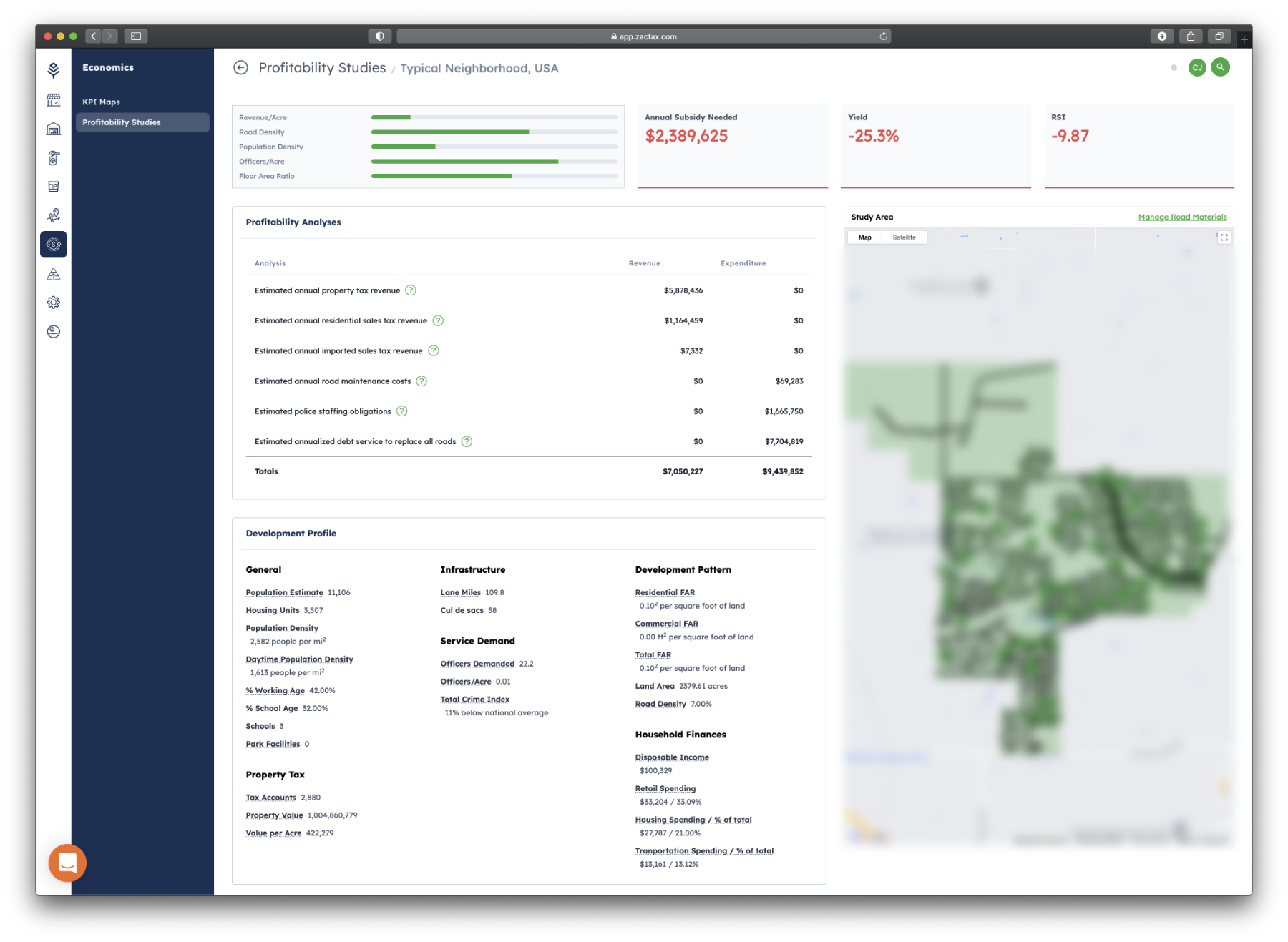The last several years have seen a significant shift in how we think about development patterns, and specifically how they relate to the long-term fiscal health of our cities. While Strong Towns has been a leader in this regard, particularly in terms of getting average citizens (read: non-city-managers) knowledgable on the topic, there are many other great firms doing exciting and in-depth fiscal analysis directly for cities, like Verdunity and Urban3.
Developing a holistic cost of service model requires a great deal of care and attention, as well as time and resources. It's the latter that prevents many small- and mid-sized cities from taking advantage of this important work.
Our recently released Decision Engine hopes to change this.
Since its inception, ZacTax has been focused on creating opinionated, easy-to-use tools to help local governments make better decisions. The Decision Engine provides two new features aimed directly at this goal: Profitability Studies and Development Proformas.
#dothemath
One of the common refrains among Strong Towns writers is to "do the math." Are your town's prevailing development patterns helping or hurting your long-term fiscal health? Can you afford to maintain the infrastructure you've obligated yourself to maintain?
Looking at your development patterns on a neighborhood-by-neighborhood basis, Profitability Studies can give you the answers to these questions and more.
Are your neighborhoods profitable?
Development patterns have consequences. The impact on infrastructure levels, public amenities, public safety response times, and more all depend on how you develop. The 1,000 home single-family neighborhood that you just OK'd on the edge of town will bring with it a ton of new residents, property tax value, and sales tax revenue. But will it be enough to pay for the new obligations?
Profitability Studies look at your existing development patterns and evaluate their profitability. How much revenue do they generate? What are the infrastructure obligations? Public safety obligations? Let's dig in to how it works.

Revenue generation
Using your Property Tax subscription, we can quickly pull in the taxable value for each parcel within a neighborhood. By applying your tax rate, we can get a rough estimate of the property tax revenue generated in each neighborhood.
Sales tax is a bit more complicated, but no less important in many states. Simply allocating revenue to each neighborhood based on the businesses located within them doesn't paint a sufficiently accurate portrait of the impact of primarily residential neighborhoods. After all, the people who live in your city are often a significant percentage of the people who pay sales taxes in your city.
Using your Sales Tax subscription and household spending estimates, our Profitability model allocates household sales tax spending directly to your neighborhoods, while still accounting for business-to-business spending and sales tax importation (when non-residents come to your city to shop).
Infrastructure obligations
Although we account for roads as assets, it's important to understand them as a long-term liability. Not only do they have to be maintained, they eventually have to be replaced (and often sooner than we expected).
Our Profitability model identifies the road segments within your neighborhoods and provides annualized estimates for maintenance and eventual replacement. You can quickly specify road materials to adjust the cost factors and lifecycle expectations, providing a more accurate estimate.
Service demands
As one of the most, if not the most, expensive services provided by cities, the initial release of our Profitability model includes service demand estimates for law enforcement as well.
Future iterations will include first-party support for fire services as well as the ability to add custom analyses for parks, libraries, administrative overhead, and any number of other budget items.
Track changes
If a point-in-time snapshot of your neighborhood profitability is invaluable, being able to track the change over time is... invaluable-er? Made ups words aside, you'll be able to keep tabs on neighborhood profitability over the years. Are property values rising fast enough to close your fiscal gap? Did that road diet cut enough calories to right the ship?
Making better decisions
Profitability Studies are great for evaluating what you've done in the past, but how can we improve moving forward? That's where Development Proformas come in.
Proformas use the same Profitability engine to model prospective developments. Simply enter a few values from a development packet (housing units, tax values added, lane miles of new road, etc) and in seconds get a fiscal picture of that development from the city's perspective, rather than the developer's.
Development Proformas will help improve your development patterns by:
- Understanding the long-term impact of a prospective development on your finances
- Allowing you to negotiate incentives from a position of strength
- Providing recommendations for how an unprofitable proposal can be made profitable
It's a Pareto world, we're just living in it
If you ask around a little, you'll quickly learn that most cities suffer from development patterns that don't pay for themselves. Our new Decision Engine package is a powerful tool to evaluate those patterns and make better decisions moving forward. If we can help spread the word and move more cities toward a deeper understanding of these issues, we'll have done our job.
But at the low, low price of free (with subscriptions to Sales Tax and Property Tax), it's important to understand that we aren't providing the same granular level of detail that the firms mentioned above provide you. We're aiming to get you 80-90% of the way there. Once you've had a taste you might find that you want that more granular analysis, and we'll be there to connect you with a quality firm that can help you.
